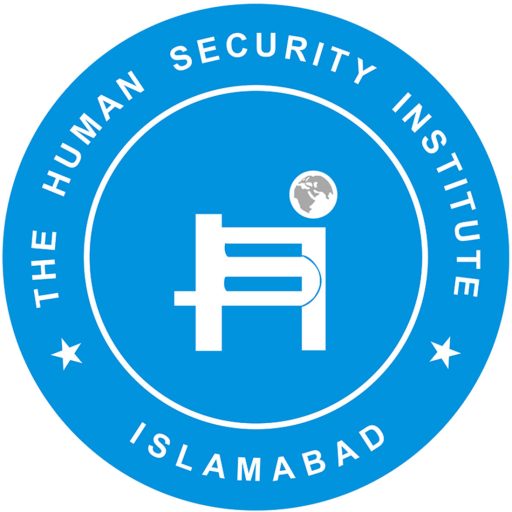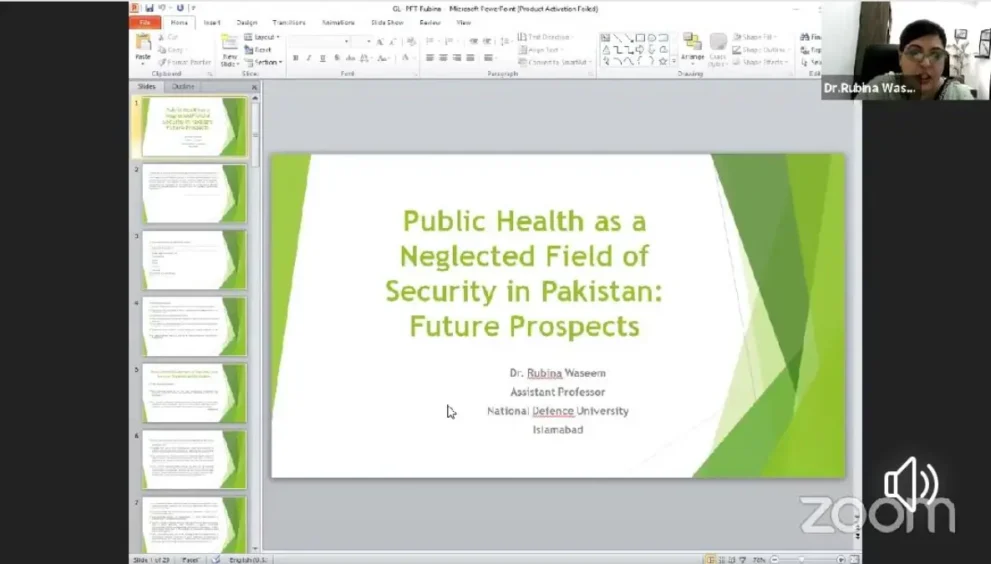The Human Security Institute
Minutes of the 8th lecture of Lecture Series on “Exploring the Dimensions of Human Security”.
Topic of the Lecture: Public Health as a Neglected Field of Security in Pakistan: Future Prospects
Guest Speaker: Dr. Rubina Waseem
Date: June 3, 2021
Time: 01:00 pm
Preamble
The World needs to widen and deepen the concept of security as the military power does not acknowledge the fact that the greatest threat to a human being is not by a military threat, but by economic, environmental, health, social, political, and more recently COVID-19 related threats that pose great danger to humans on an individual level and are unseen and unprecedented.
This non-traditional aspect of security has been neglected in Pakistan. Especially, Pakistan’s health security, or its overall public health has remained at the peripheries of its main security agenda as the country was indulged in fighting instability and threats from non-state actors.
Non-traditional security has a constituent nature which is a problem for the states. States cannot control or monopolize the implementation and effects of non-traditional security because non- traditional security is transnational in nature, and it calls for a non-traditional comprehensive approach. Hence, explained the governance paradox, which lies at the churning point of centripetal forces of centralisation of control, curtailment of rights, emphasis on securitisation of issues that have the least security concern and the centrifugal pulls of individual rights, federating units’ autonomy, global surveillance, etc.
Approach of Government of Pakistan to Meet the Challenge of COVID-19:
COVID-19 was disastrous for the world, same is the case with Pakistan. The Government of Pakistan took a few effective measures to curtail the effects of COVID-19, like establishing the “National Command and Operation Centre”, and the implementation of a system of smart lockdowns which was well received by the people of Pakistan and the global community worldwide. But the disharmony between the central and provincial governments posed as a hurdle for the proper implementation of the effective measures. There was also a lack in uniformity of the policy to curb the spread of the virus.
The predictions of COVID-19 pandemic have been proven wrong and its forecasts inaccurate time and time again, since the spread of the virus. the projections of the spread of the virus are different from the predictions. Many mathematical model-based studies projected very optimistic estimates about the worldwide spread of COVID-19, which have later proved wrong, similarly, the highly exaggerated forecasts about the US have equally been proved wrong. Therefore, it is evident that there is hardly any reliable model available to date to predict the exact number of persons with even the tentative timeline. WHO has warned on May 14, 2020, that COVID-19 would stay for a longer time, like HIV.
In the case of Pakistan, the pandemic was expected to fade away with 97% infected people recovered. A study from Kohat University said that the cumulative number of infected cases will rise from a few thousand to hundreds of thousands, whereas, the numbers can double or even triple in case of an absence of a proper lockdown system imposed across the country. Strict preventive measures are required to contain the contagion.
Another study indicates, “an integration and analysis of various research studies and numerous reliable data reflect that the COVID-19 pandemic will not be as devastating in Pakistan as it has been seen in the US, Italy, Spain, France, the UK, Belgium, Iran, and the Netherlands.”
Socio-economic Impact of COVID-19:
Economic turmoil caused by COVID 19 has far reaching effects on global economy. Financial experts are expecting a fall in global GDP and growth rate. Major events took place such as the Russia-Saudi Arabia oil price war that resulted in the collapse of oil market in march 2020. UNDP is also expecting a USD 220 billion reduction in its revenue mainly due to the subsequent economic crisis caused by the COVID-19 pandemic. The benchmark gauge imagines a 5.2 percent withdrawal in global-GDP in 2020.
International financial media houses are indicating severe contractions of global economies and forecasting the worst kind of economic recession in the world, even severe than the Economic Depression of the 1930s. WTO is expecting world trade to fall between 13% to 32%, and economies of underdeveloped regions and Asia will be badly hit. Experts agreed that COVID-19 has brought third and greatest economic shock of the 21st century post-9/11 and financial crisis of 2008.
The US stock markets have also been jolted by the crash of oil prices amid restrictions of lockdown with a sudden decline of 20%. Global oil prices are down to 21-year low and US oil turned negative for the first time in history.
International Air Transport Association (IATA) has estimated a loss of $63 billion to $113 billion to the aviation industry. Unemployment in the world has also increased manifold and keeps on increasing dangerously. More than 30 million people have filed for unemployment benefits in the US since COVID-19 spread.
Prospects for Pakistan:
Pakistan is battling the COVID19 pandemic, and it is important to highlight the main issues faced by Pakistan. Right now, Pakistan is struggling to impose effective SOPs to contain the spread of virus. Moreover, there has been a lack of testing kits in the country as most of the testing kits were brought from China and Japan. A limiting testing capacity has also caused a lot of damage as Pakistan has been unable to keep up with the rest of the world.
Testing, tracking, and lockdowns must be focused on areas where clusters are detected. The health care givers must be given adequate facilities to help contain the virus before it could wreak havoc in terms of deaths. COVID-19 is likely to leave long-lasting impacts on various aspects of our national life.
Short BIO of speaker
Dr. Rubina Waseem holds a PhD in Defence and Strategic Studies from Quaid-I-Azam University, Islamabad and is currently working as Assistant Professor at National Defence University Islamabad. Dr. Rubina has a strong background of research & training in the field of Defense & Strategic Studies.



